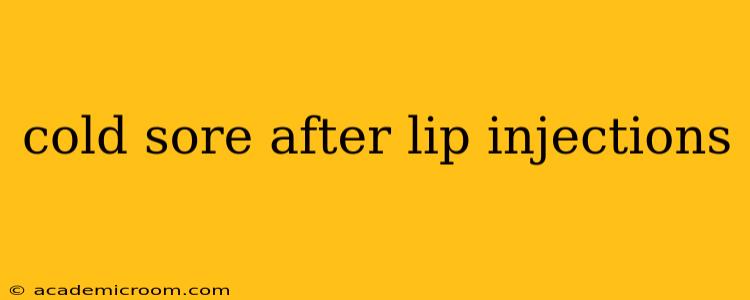Lip injections have become increasingly popular for enhancing lip fullness and achieving a more defined pout. However, one potential unwelcome side effect is the development of a cold sore (also known as a fever blister or oral herpes). This article explores the connection between lip injections and cold sores, offering insights into causes, prevention strategies, and effective treatment options.
What Causes Cold Sores After Lip Injections?
Cold sores are caused by the herpes simplex virus (HSV), specifically HSV-1. Many people carry the virus without ever experiencing symptoms. However, certain triggers can reactivate the virus, leading to the characteristic painful blisters. Lip injections, while generally safe, can sometimes act as a trigger for several reasons:
- Trauma to the Lip: The injection process itself can cause minor trauma to the lip tissue. This micro-trauma can disrupt the skin's barrier and potentially reactivate the dormant HSV.
- Stress: The stress associated with undergoing a cosmetic procedure, even a minor one, can weaken the immune system, making individuals more susceptible to viral outbreaks.
- Hormonal Changes: Some people experience hormonal fluctuations after injections, which can influence immune function and increase the likelihood of a cold sore.
It's crucial to understand that lip injections do not cause the herpes virus itself. The procedure simply acts as a potential trigger for those who already carry the virus.
Can You Get a Cold Sore from the Injection Itself?
This is a common concern. While highly unlikely, it's theoretically possible to contract HSV through contaminated needles or equipment. However, reputable clinics and practitioners adhere to strict sterilization protocols, significantly minimizing this risk. Choosing a licensed and experienced injector who prioritizes hygiene is crucial to mitigate this possibility.
How Can I Prevent Cold Sores After Lip Injections?
Preventing a cold sore after lip injections involves a multi-pronged approach:
- Pre-Procedure Consultation: Discuss your history of cold sores with your injector. This is vital information that can help determine the best course of action, including potential preventative measures.
- Antiviral Medication: Your doctor might prescribe antiviral medication (like acyclovir or valacyclovir) before or after the procedure to suppress the virus and reduce the risk of an outbreak.
- Stress Management: Practice stress-reducing techniques like yoga, meditation, or deep breathing exercises before and after your appointment.
- Immune Support: Maintain a healthy immune system through proper nutrition, adequate sleep, and regular exercise.
What Should I Do If I Get a Cold Sore After Lip Injections?
If a cold sore develops after your lip injections, contact your doctor or injector immediately. They can recommend appropriate treatment, such as:
- Over-the-Counter Treatments: Topical creams containing antiviral agents or pain relievers can help manage symptoms and promote faster healing.
- Prescription Medications: In severe cases, your doctor may prescribe stronger antiviral medications to expedite healing.
- Avoid Touching the Cold Sore: This will prevent spreading the virus to other areas of the body or to other individuals.
Are Cold Sores a Common Side Effect of Lip Injections?
While not a frequent occurrence, cold sores are a recognized possible side effect. The risk increases significantly if you have a history of cold sores or frequently experience outbreaks.
How Long Do Cold Sores Last After Lip Injections?
The duration of a cold sore depends on individual factors but typically lasts for 7-10 days. With proper treatment, this timeframe can be reduced.
Can I still get lip fillers if I've had cold sores in the past?
Yes, you can still get lip fillers if you've had cold sores in the past. However, it’s extremely important to inform your injector about your history. They can take appropriate steps to minimize the risk of reactivation, such as prescribing antiviral medication.
This information is for educational purposes only and does not constitute medical advice. Always consult a qualified healthcare professional for any health concerns or before making any decisions related to your health or treatment.
